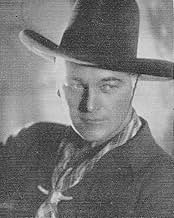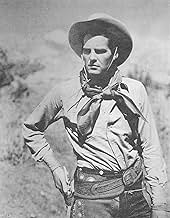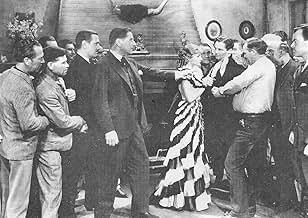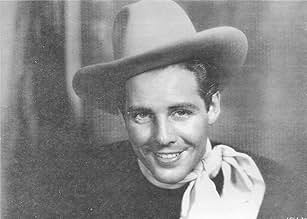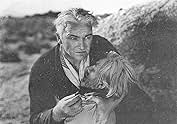AVALIAÇÃO DA IMDb
6,7/10
438
SUA AVALIAÇÃO
Adicionar um enredo no seu idiomaAn evil ranch foreman tries to provoke a range war by playing two cattlemen against each other while helping a gang to rustle the cattle.An evil ranch foreman tries to provoke a range war by playing two cattlemen against each other while helping a gang to rustle the cattle.An evil ranch foreman tries to provoke a range war by playing two cattlemen against each other while helping a gang to rustle the cattle.
- Direção
- Roteiristas
- Artistas
James Ellison
- Johnny Nelson
- (as Jimmy Ellison)
George 'Gabby' Hayes
- Uncle Ben
- (as George Hayes)
Sid Jordan
- Wrangler
- (não creditado)
John Merton
- Party Guest with a Pint in His Hip Pocket
- (não creditado)
Pascale Perry
- Outlaw Guard
- (não creditado)
Joe Phillips
- Party Guest
- (não creditado)
Monte Rawlins
- Cowhand Party Guest
- (não creditado)
- Direção
- Roteiristas
- Elenco e equipe completos
- Produção, bilheteria e muito mais no IMDbPro
Avaliações em destaque
William Boyd, a hugely popular actor during the silent film era, saw his career wilting in the early 1930s after a mix-up by a newspaper sent his reputation spiraling downwards. When he auditioned for Paramount Pictures' low-budgeted Western, August 1935 "Hop-Along Cassidy," the studio offered him the role as one of the ranch supervisors-but not the lead. Boyd knew his on-screen magnetic personality was perfect for the series' hero, and lobbied hard for the role as Bill Hop-Along Cassidy. The actor eventually beat out his competition, and the life-changing role became one of Hollywood's more feel-good stories in cinema.
Western movies had been relegated to 'Poverty Row" status ever since the spectacular failure of Raoul Walsh's 1930 "The Big Trail." The Grade B "program westerns" were quickly churned out with their low quality camerawork and acting, and played in largely rural theaters. Paramount Pictures wanted to elevate the genre by producing a series with upgraded storylines, higher production values and more polished acting. The studio eventually realized Boyd's past film experience was an asset to achieve its goals. At first the part was offered to James Gleason (not the comedian), but the actor had just signed a deal with RKO and was handcuffed. Once Boyd got the role, the series became a long-lasting fan favorite right from its premier, lasting well beyond going to the new medium of television in 1948. Hopalong Cassidy's programing is credited for making Westerns the most popular genre in the early days of TV.
Boyd first appeared in film in 1918, and was a favorite of director Cecil B. DeMille in his role as Simon in 1927's "The King of Kings." His lead in 1926's silent "The Volga Boatman," DeMille's personal favorite, solidified Boyd's reputation when cinema transitioned to talkies. But RKO cut him loose when its executives read a newspaper account alongside Boyd's picture that he was arrested on gambling and illegal alcohol charges. The editors mixed him up with another actor named William 'Stage" Boyd, who was the real culprit. Yet, when the paper published a correction, "The damage was already done," Boyd lamented. No studio wanted to touch him until 'Stage' Boyd died in 1935, coincidently the same year William earned the Cassidy role.
Boyd's portrayal of Hopalong didn't resemble the title character in Clarence Mulford's 1904 stories. The author's Western hero was rude, rough in speech, and constantly had a chip on his shoulder. The literary character sustained a bullet embedded in his leg during a gunfight, causing him to hop while he walked, earning the nickname 'Hopalong.' Boyd's 'Hopalong' on the screen was civil, friendly, and well-spoken. He consistently appeared on the scene whenever crooks were making honest people's lives miserable. Cassidy was accompanied by a younger man, Johnny, first played by James Ellison, who was always getting into trouble but had a yen for women in distress, along with a grizzled old man first played by actor George 'Gabby' Hayes.
Boyd played in 66 Hopalong Cassidy one-hour movies. When Hollywood studios phased out low-budget films by the time television became popular in 1948, they stopped producing Hopalong features (Boyd financed the final 12 episodes himself.). The actor, though, saw a market for those 66 Hopalong films, and mortgage everything he had, $350,000, to buy the entire catalogue from the studio. The unemployed actor Boyd approached NBC to see if the network was interested in playing some of his old Westerns. Looking for programming to fill its new medium, NBC agreed to air them for a nominal fee. A new generation of viewers grew to love the action-packed films which were shown on Sunday nights. These weekly Sunday evening one-hour Westerns became known as 'Hoppy Nights,' and Boyd emerged as one of TV's first stars, earning not only a fortune for his ownership of the series but he also received lucrative licensing contracts to market Hopalong merchandise.
In the inaugural debut of Hop-along (the only film with a hyphen in his name), Bill Cassidy works for the Bar 20 Ranch, which sees its cattle stolen one-by-one. At a nearby ranch, H2, its foreman, Jack Anthony (Kenneth Thomson), is a cattle rustler leading his gang to steal. He's blaming the Bar 20 Ranch employees for the loss of their cattle, and the two ranches soon become embroiled by Anthony's maneuvers. Writes film reviewer Laura Grieve, "All in all, it's a strong film which set a firm foundation for the many Hopalong Cassidy films and TV episodes to follow."
The character Hopalong Cassidy was nominated by the American Film Institute as one of movie's Heroes of All-Time.
Western movies had been relegated to 'Poverty Row" status ever since the spectacular failure of Raoul Walsh's 1930 "The Big Trail." The Grade B "program westerns" were quickly churned out with their low quality camerawork and acting, and played in largely rural theaters. Paramount Pictures wanted to elevate the genre by producing a series with upgraded storylines, higher production values and more polished acting. The studio eventually realized Boyd's past film experience was an asset to achieve its goals. At first the part was offered to James Gleason (not the comedian), but the actor had just signed a deal with RKO and was handcuffed. Once Boyd got the role, the series became a long-lasting fan favorite right from its premier, lasting well beyond going to the new medium of television in 1948. Hopalong Cassidy's programing is credited for making Westerns the most popular genre in the early days of TV.
Boyd first appeared in film in 1918, and was a favorite of director Cecil B. DeMille in his role as Simon in 1927's "The King of Kings." His lead in 1926's silent "The Volga Boatman," DeMille's personal favorite, solidified Boyd's reputation when cinema transitioned to talkies. But RKO cut him loose when its executives read a newspaper account alongside Boyd's picture that he was arrested on gambling and illegal alcohol charges. The editors mixed him up with another actor named William 'Stage" Boyd, who was the real culprit. Yet, when the paper published a correction, "The damage was already done," Boyd lamented. No studio wanted to touch him until 'Stage' Boyd died in 1935, coincidently the same year William earned the Cassidy role.
Boyd's portrayal of Hopalong didn't resemble the title character in Clarence Mulford's 1904 stories. The author's Western hero was rude, rough in speech, and constantly had a chip on his shoulder. The literary character sustained a bullet embedded in his leg during a gunfight, causing him to hop while he walked, earning the nickname 'Hopalong.' Boyd's 'Hopalong' on the screen was civil, friendly, and well-spoken. He consistently appeared on the scene whenever crooks were making honest people's lives miserable. Cassidy was accompanied by a younger man, Johnny, first played by James Ellison, who was always getting into trouble but had a yen for women in distress, along with a grizzled old man first played by actor George 'Gabby' Hayes.
Boyd played in 66 Hopalong Cassidy one-hour movies. When Hollywood studios phased out low-budget films by the time television became popular in 1948, they stopped producing Hopalong features (Boyd financed the final 12 episodes himself.). The actor, though, saw a market for those 66 Hopalong films, and mortgage everything he had, $350,000, to buy the entire catalogue from the studio. The unemployed actor Boyd approached NBC to see if the network was interested in playing some of his old Westerns. Looking for programming to fill its new medium, NBC agreed to air them for a nominal fee. A new generation of viewers grew to love the action-packed films which were shown on Sunday nights. These weekly Sunday evening one-hour Westerns became known as 'Hoppy Nights,' and Boyd emerged as one of TV's first stars, earning not only a fortune for his ownership of the series but he also received lucrative licensing contracts to market Hopalong merchandise.
In the inaugural debut of Hop-along (the only film with a hyphen in his name), Bill Cassidy works for the Bar 20 Ranch, which sees its cattle stolen one-by-one. At a nearby ranch, H2, its foreman, Jack Anthony (Kenneth Thomson), is a cattle rustler leading his gang to steal. He's blaming the Bar 20 Ranch employees for the loss of their cattle, and the two ranches soon become embroiled by Anthony's maneuvers. Writes film reviewer Laura Grieve, "All in all, it's a strong film which set a firm foundation for the many Hopalong Cassidy films and TV episodes to follow."
The character Hopalong Cassidy was nominated by the American Film Institute as one of movie's Heroes of All-Time.
I thought this —the first Hoppy movie— was excellent and entertaining. It could have had more action and a better mystery-detective-like plot, but so what? It was rich in character exposition, plus the fine acting, scenery, etc. James Ellison was the best young Hoppy sidekick in my opinion. I also enjoyed the acting and dialog from Uncle Ben (Gabby Hayes), Buck Peters and Red Connors characters. I was touched by the qualities expressed by the whole Bar 20 family: honor, loyalty, friendship, love, respect, competence, etc. Best,of course, is William Boyd's acting/persona. There is no need to repeat plot here as it is done in other user reviews. Key memorable scenes were (1) Hoppy's first introduction to Johnny Nelson, who had only heard heroic tales about Hoppy and had resented them; and (2) Uncle Ben's almost mystical communication with Hoppy to relay clues about the rustlers.
"Hop-Along Cassidy" (aka "Hopalong Cassidy Enters") was the first of 66 features starring William Boyd as Hoppy. One of the most successful and best written of the "B" western series, it was to run from 1935 to 1948.
As written by Clarence E. Mulford, Cassidy was a crude, crusty ranch hand and definitely not intended as a Saturday Matinee hero. In fact, character actor James Gleason, who looked nothing like a hero was apparently first offered the part.
Boyd, who had been around Hollywood since the early 20s and had fallen from grace, ultimately was cast in the part. It was decided between himself and producer Harry "Pop" Sherman that Boyd would not play the character as written.
In this first entry in the series, Boyd plays the character with a few rough edges, all of which would disappear in future films. He starts out as "Bill" Cassidy but acquires his nickname "Hopalong" when is wounded in the leg and is forced to hop along with the aid of a cane.
The story involves two competing ranchers, Buck Peters of the Bar-20 (Charles Middleton) and Meeker (Robert Warwick) arguing over the open range land for their cattle. Meeker's foreman known as Pecos Jack (Kenneth Thompson) is behind a plot to set the two ranches against each other while stealing their cattle, changing their brands and selling them off for himself.
In this first entry in the series the traditional trio comprises Hoppy, Johnny Nelson (James Ellison) and Red Connors (Frank McGlynn Jr.). George Hayes by this time had evolved into the character he would play for the rest of his career. In this picture he plays a ranch hand named "Uncle Ben". Although still not using the name "Gabby", he would appear later in the series as the grizzled sidekick "Windy Halliday".
Also in the cast are Paula Stone as Mary Meeker, Ellison's love interest, Willie Fung as the Meeker's Chinese cook, who provides most of the comic relief, and veterans John Merton and Franlyn Farnum in other roles.
Charles Middleton would achieve some measure of fame as "Ming the Merciless" in the Flash Gordon serials. The character of Red Connors would be resurrected in the Hopalong Cassidy TV series of the 50s with Edgar Buchanan playing the part.
As written by Clarence E. Mulford, Cassidy was a crude, crusty ranch hand and definitely not intended as a Saturday Matinee hero. In fact, character actor James Gleason, who looked nothing like a hero was apparently first offered the part.
Boyd, who had been around Hollywood since the early 20s and had fallen from grace, ultimately was cast in the part. It was decided between himself and producer Harry "Pop" Sherman that Boyd would not play the character as written.
In this first entry in the series, Boyd plays the character with a few rough edges, all of which would disappear in future films. He starts out as "Bill" Cassidy but acquires his nickname "Hopalong" when is wounded in the leg and is forced to hop along with the aid of a cane.
The story involves two competing ranchers, Buck Peters of the Bar-20 (Charles Middleton) and Meeker (Robert Warwick) arguing over the open range land for their cattle. Meeker's foreman known as Pecos Jack (Kenneth Thompson) is behind a plot to set the two ranches against each other while stealing their cattle, changing their brands and selling them off for himself.
In this first entry in the series the traditional trio comprises Hoppy, Johnny Nelson (James Ellison) and Red Connors (Frank McGlynn Jr.). George Hayes by this time had evolved into the character he would play for the rest of his career. In this picture he plays a ranch hand named "Uncle Ben". Although still not using the name "Gabby", he would appear later in the series as the grizzled sidekick "Windy Halliday".
Also in the cast are Paula Stone as Mary Meeker, Ellison's love interest, Willie Fung as the Meeker's Chinese cook, who provides most of the comic relief, and veterans John Merton and Franlyn Farnum in other roles.
Charles Middleton would achieve some measure of fame as "Ming the Merciless" in the Flash Gordon serials. The character of Red Connors would be resurrected in the Hopalong Cassidy TV series of the 50s with Edgar Buchanan playing the part.
It was interesting for me to see this first of the Hopalong Cassidy movies last night. I saw a distinctly different Hopalong than those later movies I have seen. This one had a hard look in his eye that was most menacing and at one point, he was about to draw his gun on his own man, which made for a completely different Hopalong than the one which emerged in time. He actually resembled men of the REAL OLD WEST instead of the watered-down, lip-stick sissy version most of Western characters in the movies had--such as Gene Autry.
I remember last year I got to see the very first episode of Bonanza--the TV Western series. I noticed the same thing there how the Cartwrights were hard, rough and even deadly (the way men were in the REAL WEST) and, having watched the series over several years, I noticed they too mellowed with time.
Otherwise, I certainly enjoyed this first issue of Hopalong Cassidy. He was certainly my HERO as a small boy of 5-6 back in 1953-1954 when I first started watching him on TV. And it was good to view this one.
I won't bother with the plot. Others have already done that. But the point I made is one that clearly stood out to me about this very first movie in the series.
I remember last year I got to see the very first episode of Bonanza--the TV Western series. I noticed the same thing there how the Cartwrights were hard, rough and even deadly (the way men were in the REAL WEST) and, having watched the series over several years, I noticed they too mellowed with time.
Otherwise, I certainly enjoyed this first issue of Hopalong Cassidy. He was certainly my HERO as a small boy of 5-6 back in 1953-1954 when I first started watching him on TV. And it was good to view this one.
I won't bother with the plot. Others have already done that. But the point I made is one that clearly stood out to me about this very first movie in the series.
I thought the movie had the "feel" of western life..the cattle grazing in the opener..the dust on the outfits (except Johnny's!)You could even see the dust flying in several scenes....good characters, except the foreman (just didn't fit)..Ellison excellent as Johnny..and Hayes, McGlynn as Red and Middleton as Buck--all good...how about the scene where Hoppy appears riding Topper (I guess it was Topper,then) down that steep hill? I like the silent film "leftovers", like Hoppy's steely glare and the gathering of the ranchers scene near the end...Just a very well-done, enjoyable film! This movie borrows plot elements from the book Hopalong Cassidy (1910)-- Meeker, the H2 spread, Thunder Mesa..to name a few. I'm still reading the book, so I don't know all the details..! Interesting note-- the two well-known western character actors--Boyd and Hayes-- are from Eastern locales: Marion, Ohio and Wellsville, NY, respectively. Once again--a top rating for this film! John Field
Você sabia?
- CuriosidadesWilliam Boyd was originally offered the role of Buck Peters, the Bar 20 ranch foreman, but chose the role of Cassidy.
- ConexõesEdited into Border Justice (1951)
- Trilhas sonorasFollowin' the Stars
Music and lyrics by Sam H. Stept and Dave Franklin
Sung by James Ellison and Frank McGlynn Jr.
Played as background music often
Principais escolhas
Faça login para avaliar e ver a lista de recomendações personalizadas
Detalhes
- Data de lançamento
- País de origem
- Idioma
- Também conhecido como
- Hop-a-Long Cassidy
- Locações de filme
- Empresa de produção
- Consulte mais créditos da empresa na IMDbPro
Bilheteria
- Orçamento
- US$ 85.000 (estimativa)
- Tempo de duração1 hora
- Cor
- Proporção
- 1.37 : 1
Contribua para esta página
Sugerir uma alteração ou adicionar conteúdo ausente

Principal brecha
By what name was Vida e Aventura (1935) officially released in Canada in English?
Responda

